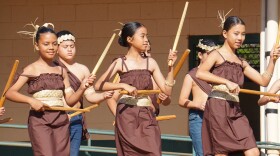The 13th Festival of Pacific Arts and Culture has come to a close and thousands of Indigenous islanders are now returning home, each carrying a piece of cultural knowledge with them.
During Sunday's closing ceremony, thousands of Pacific Islanders from 26 nations gave a standing ovation to conclude the end of the festival at the University of Hawaiʻi at Mānoaʻs Stan Sheriff Center.
Many Pacific Islanders at the festival said it was unlike any other FestPAC they had attended.
While FestPAC was created in 1972 to halt the erosion of Pacific traditions through cultural exchange, some attendees said there was more dialogue this year, especially about pressing issues — such as climate change — currently facing their island nations.

"It shouldnʻt be a festival where we talk about these issues and raise these issues," said Miles Young, director of the Human Rights and Social Development Division at the Pacific Community based in Suva, Fiji. "We should also be looking at solutions on how we can work together to address these solutions and I'm really happy to say there have been those conversations."
The festival rotates every four years across Polynesia, Micronesia and Melanesia. This year was Hawaiʻi's first time hosting FestPAC after four years of delay due to the COVID-19 pandemic.
Delegates from Rapa Nui, Tonga, the Federated States of Micronesia and several other nations showcased their culture through dance, weaving, tattooing, carvings and more.
During Sunday's closing ceremony, Hawaiʻi's FestPAC Director Aaron Salā said the festival was dedicated to Pacific Islanders in the diaspora.
"This opportunity was ours to give to you so that you might know that we see you," Salā said. "So that you might know that our power is because of you."
Pacific Islanders make up about half a percent of the U.S. population, including more than 300,000 who reside in Hawaiʻi, according to the U.S. Department of Health and the Human Services Office of Minority Health.
Taufa Setefano, a Tongan from California, said this was her first time attending FestPAC. Delegates from Tonga were the loudest during the opening ceremony, waving their red and white flags.
She said the festival inspired and made her feel a sense of belonging.
"Being Tongan in the diaspora, you're not Tongan enough in Tonga, and when you're in the Western society, you're not American enough," she said. "So it's a dynamic that questions your belonging."
"I feel like FestPAC has allowed that bridge to be made because your country is showing up to where you're at. … I do have roots in this land and they're living and they're thriving, and I can talk to them and they're here," she continued. "It's been beautiful."

Henry Isa has attended a total of eight FestPACs. The 74-year-old from the Solomon Islands said the festival changed his life when he first attended in 1980 in Papua New Guinea.
"We must know who we are, where we come from, in the spirit of our heritage," he said. "Whether it be Micronesia, Melanesia or Polynesia — we have a common thread that goes through us that we must maintain at all times."
He said he's worried that new-age technology might distract younger generations from wanting to learn about their culture.
"From the early beginning of the festival, a lot of changes have happened and new challenges have come up, but issues are still the same," Isa said. "The principles of why it (FestPAC) was established from the start is the preservation of our cultures, and we must not allow the deterioration of it. Especially when we have the challenge of tourism and other developments."
Among the festivities, Pacific Islander delegates stood in solidarity with New Caledonia, who pulled out of the festival at the last minute due to deadly unrest.
New Caledonia's hale was adorned with artworks and gifts. Many people occupied the hale in solidarity with the French territory.
"When such difficulties happen, we reflect back on our homes," Isa said." We feel disheartened, but all the same, it gives us the opportunity to show our support and solidarity from the rest of the Pacific Island. This festival opens up a lot of avenues so that we are able to look forward as times are changing."
New Caledonia is slated to host the 14th FestPAC in 2028. The French territory underwent unrest after the French government approved a constitutional amendment allowing new arrivals to vote in local elections. It's a move the Kanaks said would dilute Indigenous voices.
Letila Mitchell of the South Pacific Commission said New Caledonia is still committed to hosting FestPAC.
She said that the Hawaiʻi planners will work with New Caledonia's planners in preparation for the next event.
"Over the next year, that knowledge transfer will happen, and we will begin the first site visits of New Caledonia next year and start building the infrastructure and looking at their programming," Mitchell said.
For HPR's complete coverage of this year's FestPAC, click here.







